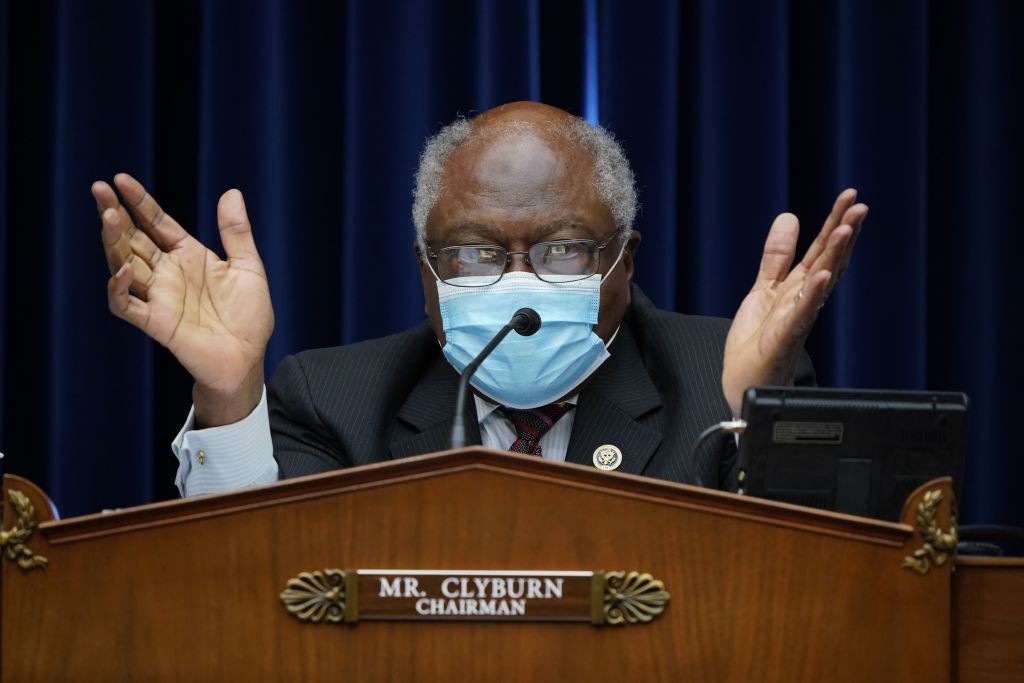Singing The Black National Anthem Won’t Stop White Terror
Suggesting “Lift Every Voice and Sing” as a national pacifier is a bad look for Rep. James Clyburn (D-South Carolina), taking his role as elder Black spokesperson a bit too far.
Clyburn’s suggestion came less than a week after a violent white nationalist attack on the U.S. Capitol. Meanwhile, reports indicate that pro-Trump insurrectionists are planning more incursions on D.C. and state capitols around the country.
Just thinking about how to respond in this moment, one of the last things on my list would be the United States needs to start singing the Black National Anthem. Reserved for school events and other special occasions, “Lift Every Voice and Sing” comes with a particular history and ritual that cannot just be inserted into this current moment.
To make ‘Lift Every Voice and Sing’ a national hymn, would be an act of bringing the country together.
The gesture itself would be an act of healing.
Everybody can identify with that song. https://t.co/7LvE8eYadU
— James E. Clyburn (@WhipClyburn) January 12, 2021
This is even worse than members of Congress kneeling while wearing Kente cloth last June. At a time when Black people and others were taking to the streets to demand justice, Clyburn and his colleagues rushed to make a symbolic gesture but failed to propose any meaningful legislation.
Meaningless optics that do nothing to address the issues and conditions impacting Black communities are harmful to Black communities. Why? Because turning the other cheek and joining hands with those who would eliminate us is not healing. Calls to repair race relations often begin from a flawed premise that there are only two sides, each bearing equal responsibility for the current conditions. And these calls often rely heavily on the benevolence and forgiveness of Black people.
People need leadership to fight for results, not appearances. For Clyburn to assert that everyone can relate to the meaning and words of the song shows a fundamental misunderstanding of what people need right now. This current moment cannot and will not be fixed by symbolic gestures and Disney movie resolutions. Ultimately these efforts are not even for those of us attacked for our very existence, but for the pearl-clutching white liberals and their attachés of color who just want things to go back to normal. This is for the people who swear that “America is better than this.”
But placating whiteness and rushing to get past highly visible instances of white supremacist violence never brings healing for anyone other than white people desperate to be plugged back into the Matrix.
Relying on the hope of people finding commonality in the meaning of the words and spirit of the hymn is shortsighted. More than that, it also expects people who do not recognize our rights or humanity to suddenly see value in us through song. Focusing on how to “heal” without actually addressing the underlying conditions and issues affecting people’s lives does nothing for those actually in need.
As a southern-born Black man of a certain age, one can only imagine what it must have been like for Clyburn growing up and later stepping into varying roles in government. But the current moment is unlike any other previously experienced and leadership must seize on the opportunity to address the enduring and destructive legacy of white supremacy.
As we approach Dr. Martin Luther King Day, as a nation, we are once again faced with what he so resolutely called ‘the urgency of now.’ Now, what are we going to demand from our elected officials?
Clyburn’s suggestion isn’t about what is better for Black people; it’s about what will make whiteness comfortable. Leaders should be using this moment to unequivocally stand firm against the rise of fascism and white nationalist violence coupled with agenda-setting to help uplift communities across the country.
To heal the country, impacted communities need to be made whole. After generations of exploitation and disinvestment, the worsening COVID-19 pandemic, and economic downturn, holding hands and singing is the last thing on any of our minds. Congressional leadership should be setting forth an agenda putting the actual needs and conditions of communities front and center, not worrying about feel-good optics.
Part of any agenda should include passage of H.R. 40, establishing a commission to study racist laws and practices including slavery as well as proposals for reparations, redress and repair. Originally introduced by Congressman John Conyers in 1989, H.R. 40 must be passed and moved into law.
We must not be passive in this moment. We push back now harder than ever before. And while a study commission alone is not the answer, it is a stronger call to action than blanketing racist terror in the words of “Lift Every Voice and Sing.”
It is a call signaling to those who would silence our communities that there is no backing down.
Anoa Changa is a movement journalist and retired attorney based in Atlanta, Georgia. Follow Anoa on Instagram and Twitter @thewaywithanoa.
SEE ALSO:

